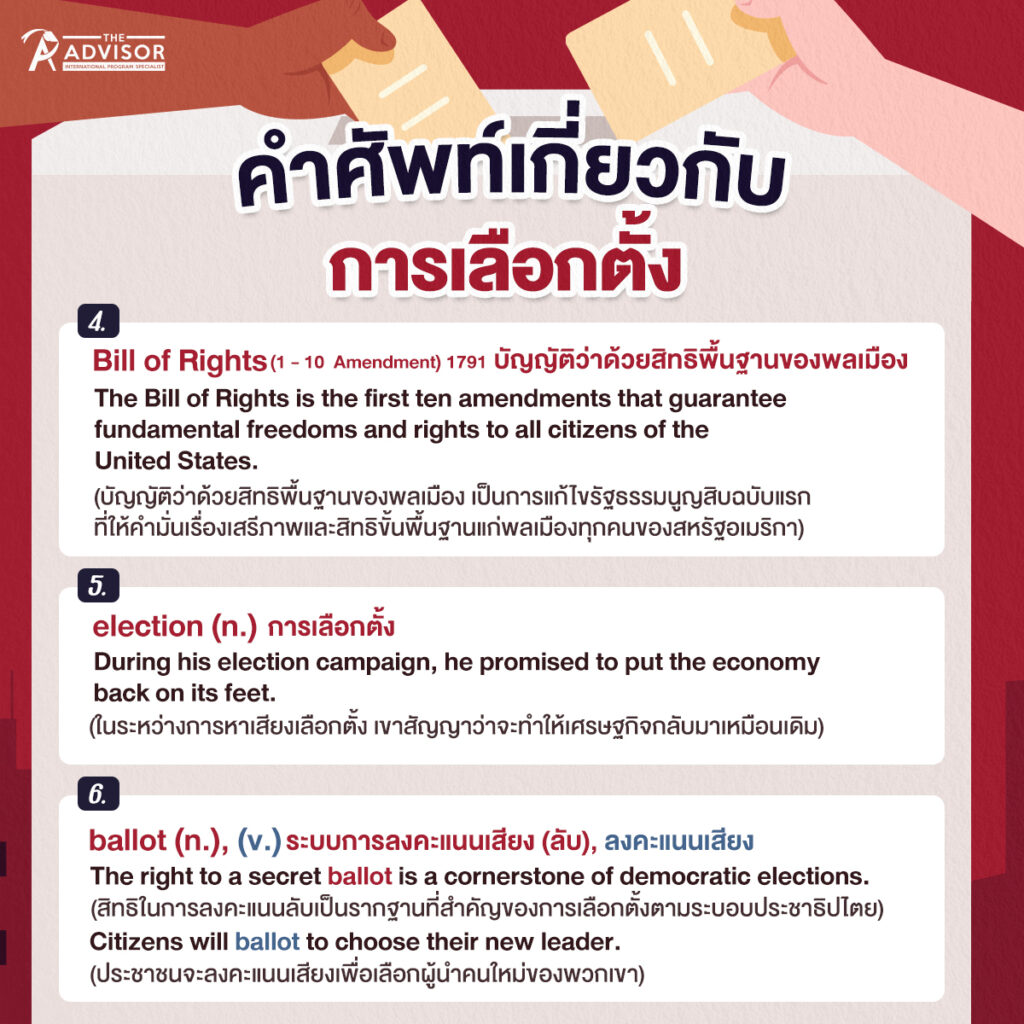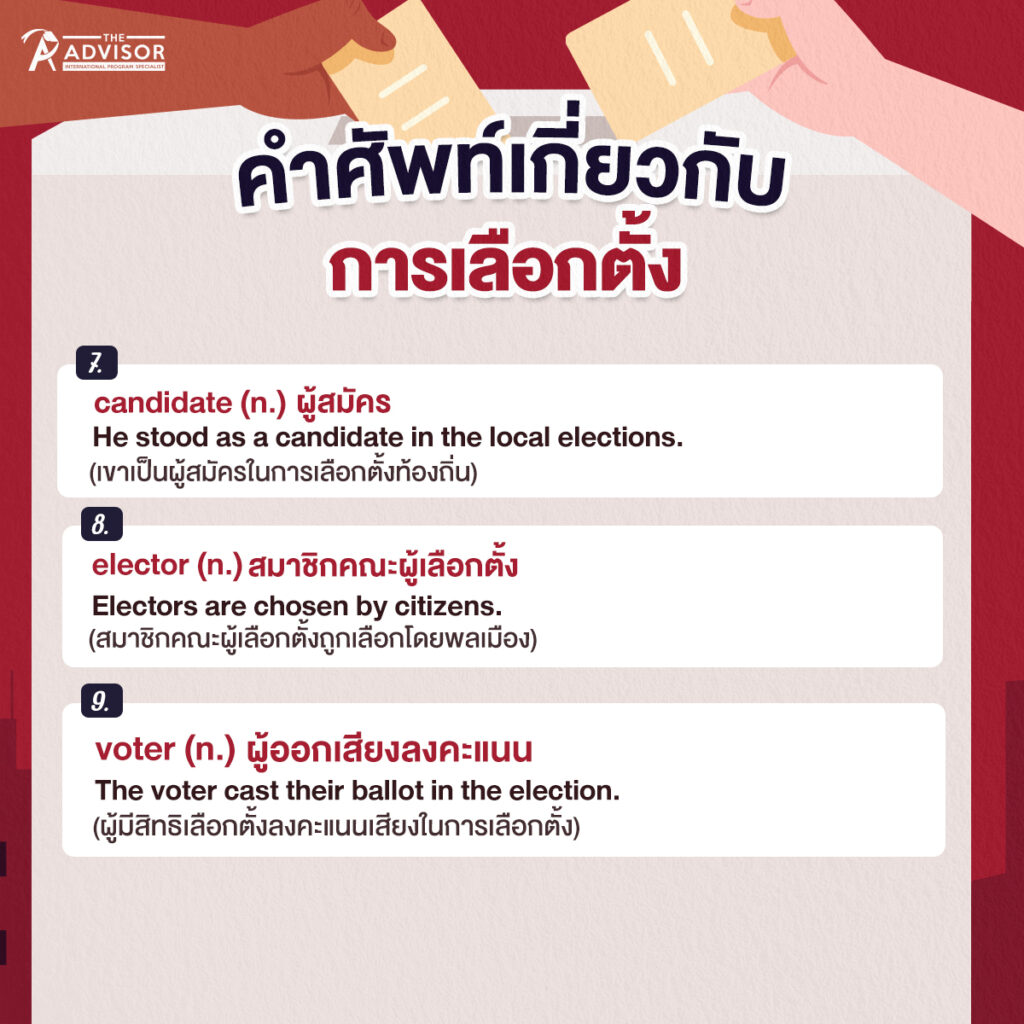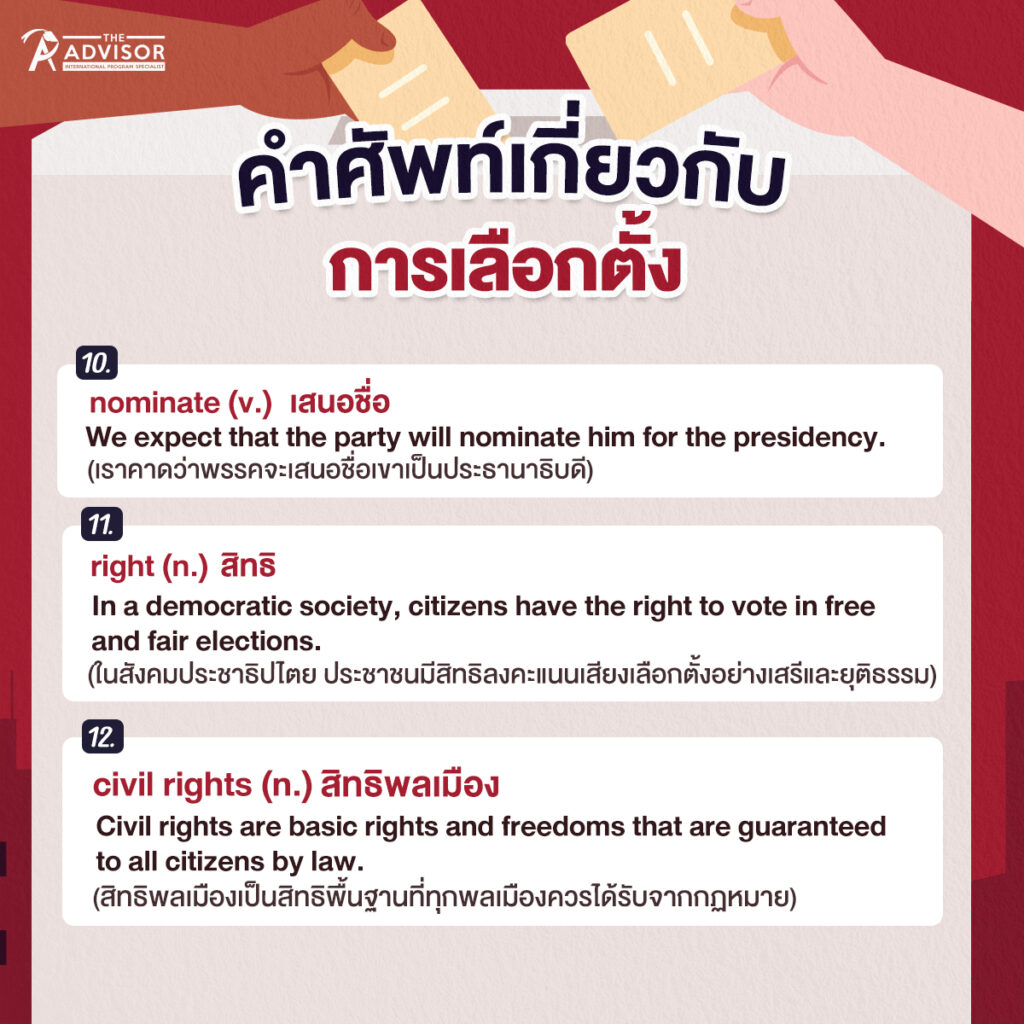
คำศัพท์ในหัวข้อ ELECTION (การเลือกตั้ง) ที่เจอบ่อยใน GED SOCIAL STUDIES
คำศัพท์ในหัวข้อ ELECTION (การเลือกตั้ง) ที่เจอบ่อยใน GED SOCIAL STUDIES
สวัสดีค่ะ วันนี้ครูกิฟฟ์จะพาน้อง ๆ มารู้จัก คำศัพท์ในหัวข้อ ELECTION ที่เจอบ่อยในข้อสอบ GED Social Studies กันค่ะ โดยเฉพาะในพาร์ต Civics and Government และ The U.S. Government ที่มักออกคำศัพท์เกี่ยวกับการเลือกตั้งเป็นประจำ พร้อมคำแปลภาษาไทยให้น้อง ๆ เข้าใจง่ายและจำได้แม่นขึ้นค่ะ คำศัพท์เหล่านี้ไม่เพียงช่วยให้น้อง ๆ ทำข้อสอบได้ดีขึ้น แต่ยังช่วยให้เข้าใจเนื้อหาเกี่ยวกับการเมืองของสหรัฐฯ ได้ชัดเจนยิ่งขึ้นด้วยนะคะ
รวมคำศัพท์ในหัวข้อ ELECTION ที่ควรรู้สำหรับสอบ GED Social Studies
รวมคำศัพท์ในหัวข้อ ELECTION เรียงตามลำดับอักษร
1. constitution (v.)
คำแปล: รัฐธรรมนูญ หรือ กฎหมายสูงสุด
ตัวอย่างประโยค: The Constitution is the supreme law of the country.
2. draft (v., n.)
คำแปล: ร่าง หรือ เอกสารฉบับร่าง (มักใช้กับคำว่า bill ที่แปลว่ากฏหมายใหม่)
ตัวอย่างประโยค: The congressmen will meet to discuss and draft a bill on electricity fee.
3. amendment (n.)
คำแปล: การแก้ไขรัฐธรรมนูญ
ตัวอย่างประโยค: The first amendment of the United States Constitution guarantees freedom of speech.
4. Bill of Rights (n.)
คำแปล: บัญญัติด้วยสิทธิ์พื้นฐานของพลเมือง (เป็นศัพท์เฉพาะที่จะเจอแค่ในวิชาสังคมของอเมริกาและ GED SOCIAL เป็นการแก้ไขรัฐธรรมนูญ 10 ข้อแรกที่ถูกเขียนขึ้นในปี 1791)
ตัวอย่างประโยค: The Bill of Rights is the first ten amendments that guarantee fundamental freedoms and rights to all citizens of the United States.
5. election (n.)
คำแปล: การเลือกตั้ง
ตัวอย่างประโยค: During his election campaign, he promised to put the economy back on its feet.
6. ballot (n.) / (v.)
คำแปล: การลงคะแนนเสียง หรือ ลงคะแนนเสียง (เป็นคำที่เจอแล้วจะรู้ทันทีว่าคือการเลือกตั้งเพราะเป็นคำที่เราจะเจอแค่ในบริบทของเลือกตั้งเท่านั้น)
ตัวอย่างประโยค: The right to a secret ballot is a cornerstone of democratic elections. / Citizens will ballot to choose their new leader.
7. candidate (n.)
คำแปล: ผู้สมัคร (สามารถใช้ได้ในบริบทอื่น ๆ นอกจากเลือกตั้ง เช่น การสมัครงาน)
ตัวอย่างประโยค: He stood as a candidate in the local elections.
8. elector (n.) a person who has the right to vote in an election.
คำแปล: ผู้มีสิทธิ์โหวตในการเลือกตั้ง
ตัวอย่างประโยค: The electors will cast their votes in the upcoming presidential election.
9. voter (n.) a person who votes or has the right to vote, especially in a political election.
คำแปล: ผู้ลงคะแนนเสียง (เกี่ยวกับการเมืองหรือไม่เกี่ยวก็ได้) หรือ ผู้มีสิทธิเลือกตั้ง (ทางการเมือง)
ตัวอย่างประโยค: The voter cast their ballot in the election
10. electorate (n.) the people in a country or an area who have the right to vote, thought of as a group.
British English = a district that elects its own representative to parliament.
คำแปล: ผู้ที่มีสิทธิ์เลือกตั้งทั้งหมดในท้องถิ่นหรือเขตเขตหนึ่ง หรือ เขตเลือกตั้ง
ตัวอย่างประโยค: The political party with the most support from the electorate is likely to win the election.
11. nominate (v.)
คำแปล: เสนอชื่อ (สามารถใช้ในบริบทอื่นได้ เช่น เสนอชื่อหัวหน้าห้อง)
ตัวอย่างประโยค: We expect that the party will nominate him for the presidency.
12. right (n.)
คำแปล: สิทธิ (มักจะได้ยินคำนี้ที่แปลว่า ‘ขวา’ แต่ในบริบทของ Social Studies ‘right’ แปลว่าสิทธิ)
ตัวอย่างประโยค: In a democratic society, citizens have the right to vote in free and fair elections.
เพิ่มเติม: ปกติเราจะไม่ใส่ -s แต่ถ้าเราเฉพาะเจาะจงขึ้นมาเราจะมี -s ยกตัวอย่างคำถัดไปค่ะ
13. civil rights (n.)
คำแปล: สิทธิพลเมือง
ตัวอย่างประโยค: Civil rights are basic rights and freedoms that are guaranteed to all citizens by law.
เพิ่มเติม: สาเหตุที่คำนี้มี -s เพราะว่าในสิทธิพลเมืองนั้นสามารถมีได้หลายข้อ




จบแล้วว .. 13 คำศัพท์เกี่ยวกับการเลือกตั้ง สำหรับน้องน้องคนไหนที่อยากได้คำศัพท์แบบนี้ อย่าลืมติดตามกันได้ใน blog ถัดไป
ใครที่อายุ 18 ปี ขึ้นไป อย่าลืมไปใช้สิทธิเลือกตั้งกันด้วยนะคะ
จบกันไปแล้วสำหรับ คำศัพท์ในหัวข้อ ELECTION (การเลือกตั้ง) สำหรับใครที่เตรียมสอบ GED ก็ติดต่อหาพี่ๆ ได้เลย!
หากน้อง ๆ กำลังมองหาสถาบันติวสอบ GED วิชา Social Studies โดยเฉพาะ ที่ The Advisor Academy เรามีคอร์สเรียน GED ให้เลือกหลากหลาย ตั้งแต่ปรับพื้นฐานจนถึงตะลุยโจทย์ พร้อมทีมงานที่คอยดูแลและให้คำแนะนำอย่างใกล้ชิดตั้งแต่เริ่มต้นจนสอบผ่านแน่นอนค่ะ
